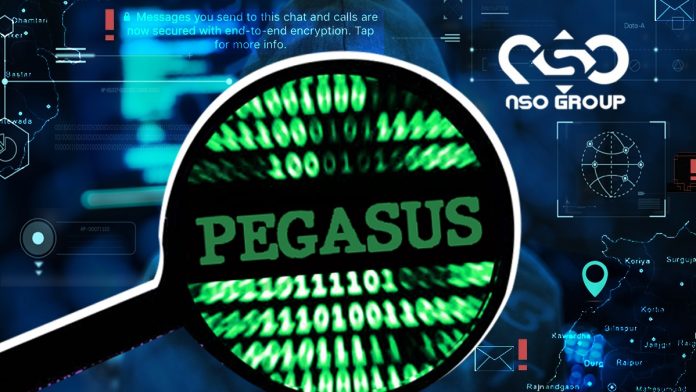Use Pegasus spyware to tackle insecurity
Authoritarian administrations targeting opposition leaders, human rights activists and journalists have deployed Pegasus spyware, apparently built by some Israeli cyber-intelligence agents who own NSO Group, for use in counter-terrorism and law enforcement work. Exposed in a recent report entitled ‘Pegasus Project’ by a coalition of news outlets and Amnesty International, the spyware has been acquired […]

Pegasus spyware
Authoritarian administrations targeting opposition leaders, human rights activists and journalists have deployed Pegasus spyware, apparently built by some Israeli cyber-intelligence agents who own NSO Group, for use in counter-terrorism and law enforcement work.
Exposed in a recent report entitled ‘Pegasus Project’ by a coalition of news outlets and Amnesty International, the spyware has been acquired by 10 countries, with over 50,000 mobile phone numbers under its radar.
- Behind the scenes of the resumed trial of Nnamdi Kanu
Court orders release of ‘BuhariMustGo’ worshippers, Sowore’s associates
However, instead of tracking down terrorists and criminals, some of the phone numbers under surveillance by regimes that subscribed to the expensive software, belong to opposition politicians, activists and journalists.
Some of the highest-ranking officials on the list of targets include the Presidents of France, Iraq, South Africa and Prime Ministers of Pakistan, Egypt and Morocco. There are also lines belonging to seven former prime ministers and even the King of Morocco is on the list. Princess Latifa, daughter of Sheikh Mohammed bin Rashid al Maktoum, the ruler of Dubai, was on the list. Her case became of particular interest because her attempt to escape and seek political asylum abroad was eventually thwarted when she was allegedly kidnapped by armed commandos who boarded the yacht she wanted to use to escape. Other victims were two women close to Jamal Khashoggi, a Saudi journalist, gruesomely murdered in 2018.
Ordinarily, this cyberintelligence software is not bad in itself. The problem is with its usage. Indeed, if deployed positively, it would assist countries, like Nigeria, in tracking terrorists and criminals. The spyware has the capacity to steal private data from phones, obtaining messages, passwords, contacts, photos and more information from the telephone of any criminal targeted by Pegasus software users.
It could turn on a phone’s camera or microphone to create covert recording, bypass encryption, intercept calls, monitor social media (Skype, WhatsApp, Facebook, Viber, Blackberry Messenger, etc) and even track the location of targets. In doing these and more, this software would leave behind no digital footprint with which it could be traced to its users. As a result of its capacity to violate security features of mobile phones and Apps, the makers of Pegasus spyware, NSO Group, was, in 2019, sued by WhatsApp, alleging that the software developer was involved in the hacking of some 1,400 devices through WhatsApp’s code. Technology companies like Microsoft, Google, Cisco and related companies reportedly supported WhatsApp’s suit against NSO Group.
Nigeria is not named among countries that have subscribed to Pegasus Spyware, but we are aware of the many benefits that the country can get out of this if used appropriately.
The nation can use this strictly to tackle terrorism and banditry that appear to have defied all strategies. Government should see how it can use this to track criminals and in the event that people have been abducted, it could also be used to find the location of the victims and work to secure their release. Already, a supplementary budget has been passed in which about N4.8 billion has been set aside to acquire technologies to intercept social media communication, including WhatsApp messages, calls on mobile phones, text messages and the like. The supplementary budget was approved for the Nigerian Intelligence Agency (NIA). A breakdown of the budget shows that N1.93 billion was earmarked for “WhatsApp Interception Solution” and N2.93 billion for “Thuraya Interception Solution”.
It is our hope that the ‘interception solutions’ will help to address the security situation in the country. But the government can also consider the Pegasus Spyware for this venture.
The main challenge in the country now is how to curtail terrorists who, in spite of the country’s telecommunications facilities, still use mobile phones to negotiate ransom payment with victims and succeed in their evil enterprise without being tracked by security operatives. The situation is becoming more scandalous now that terrorists receive funds through bank accounts, without being arrested.
Therefore, any technology that can help break that should be embraced. It is time for the government to use technology to tackle terrorists and other criminals and bring an end to the insecurity crisis that is pulling the country backwards.
